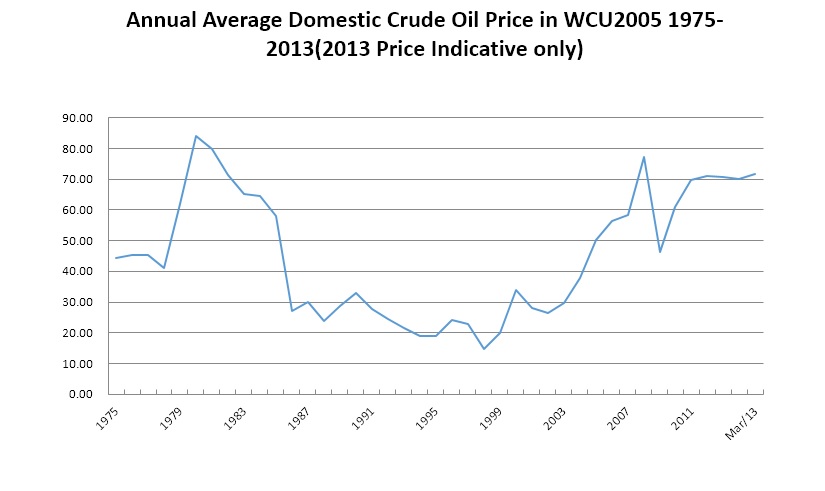Start main Content
世界貨幣單位
World Currency Unit
World Currency Unit
Home >
World Currency Unit
|
|
Annual Average Domestic |
Crude Oil Prices |
|
| 1975-Present |
| . |
(in $/bbl.) |
| Year |
Nominal |
| Real Price of oil in WCU 2005 |
|
| 1975 |
$12.21 |
44.27 |
| 1976 |
$13.10 |
45.28 |
| 1977 |
$14.40 |
45.45 |
| 1978 |
$14.95 |
41.19 |
| 1979 |
$25.10 |
62.03 |
| 1980 |
$37.42 |
84.09 |
| 1981 |
$35.75 |
79.69 |
| 1982 |
$31.83 |
71.40 |
| 1983 |
$29.08 |
65.32 |
| 1984 |
$28.75 |
64.58 |
| 1985 |
$26.92 |
58.00 |
| 1986 |
$14.44 |
27.15 |
| 1987 |
$17.75 |
30.00 |
| 1988 |
$14.87 |
23.75 |
| 1989 |
$18.33 |
28.66 |
| 1990 |
$23.19 |
32.84 |
| 1991 |
$20.20 |
27.60 |
| 1992 |
$19.25 |
24.52 |
| 1993 |
$16.75 |
21.60 |
| 1994 |
$15.66 |
19.06 |
| 1995 |
$16.75 |
19.01 |
| 1996 |
$20.46 |
24.08 |
| 1997 |
$18.64 |
22.99 |
| 1998 |
$11.91 |
14.71 |
| 1999 |
$16.56 |
20.07 |
| 2000 |
$27.39 |
33.95 |
| 2001 |
$23.00 |
28.21 |
| 2002 |
$22.81 |
26.59 |
| 2003 |
$27.69 |
29.63 |
| 2004 |
$37.66 |
37.90 |
| 2005 |
$50.04 |
50.04 |
| 2006 |
$58.30 |
56.48 |
| 2007 |
$64.20 |
58.20 |
| 2008 |
$91.48 |
77.34 |
| 2009 |
$53.48 |
46.22 |
| 2010 |
$71.21 |
60.81 |
| 2011 |
$87.04 |
69.86 |
| 2012 |
$86.46 |
70.89 |
| Jan-13 |
$87.65 |
70.58 |
| Feb-13 |
$86.25 |
69.94 |
| Mar-13 |
$87.50 |
71.80 |
|
|
The nominal value of the WCU, which is defined with respect to some base year, will rise with inflation in any of the economies represented by the WCU. Moreover, other things being equal, the nominal value of the unit will also rise if any of the base currencies appreciates against the US dollar. These characteristics make bonds denominated in the WCU very attractive to savers, who not only enjoy protection against inflation, but also the benefit of diversification of exchange risks. The prospect of these benefits is expected to allow bond issuers to offer a lower interest rate and still attract buyers.
Other Potential Uses of the WCU
(1) Commodities can be quoted in the WCU. When the prices of commodities such as crude_oil are quoted in US dollars, a depreciation in US dollars usually will lead to a rise in the price of crude oil. But whether there is an increase in the price in real terms is not transparent. Quoting prices in the WCU protects the commodity producing countries as well as commodity consuming countries from unexpected losses due to exchange rate fluctuations. Thus prices of gold, silver, as well as agricultural products can all be quoted in WCU. Contracts denominated in the WCU can be settled in any currency on the date of settlement. In the example of crude oil price, real price of oil of Year t can be derived simply by dividing the nominal price in year t by the price of WCU2005 for that year.
(2) Assets denominated in the WCU, particularly global bonds issued by reputable institutions and governments, will serve as an excellent reserve asset for central banks, which will then no longer have to worry about exchange losses due to the depreciation of any particular currency.
(3) A country that uses the WCU as an anchor for its currency will enjoy stable prices. But in a world where inflation is positive, the real purchasing power of currencies typically decline over time. A country whose currency is pegged to the WCU will keep appreciating against other currencies. To avoid this scenario, which will undermine competitiveness, it is recommended that currencies tie to the benchmark basket that underlies the WCU without indexing against inflation.


Source:http://inflationdata.com/inflation/Inflation_Rate/Historical_Oil Pricess_Table.asp
|




